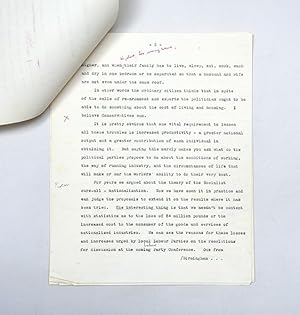Churchill Winston Fyfe Sir David (1 results)
Product Type
- All Product Types
- Books (1)
- Magazines & Periodicals
- Comics
- Sheet Music
- Art, Prints & Posters
- Photographs
- Maps
-
Manuscripts &
Paper Collectibles
Condition
- All Conditions
- New
- Used
Binding
- All Bindings
- Hardcover
- Softcover
Collectible Attributes
- First Edition
- Signed
- Dust Jacket
- Seller-Supplied Images
- Not Printed On Demand
Seller Location
Seller Rating
-
Typescript, corrected by Churchill, Party Political Broadcast, 9.15 p.m. 20th September, 1951.
Published by 1951, 1951
Seller: Peter Harrington. ABA/ ILAB., London, United Kingdom
Winston Churchill extensively amends the text for a broadcast by his shadow minister of labour David Maxwell Fyfe in the run up to the October 1951 general election, which returned Churchill to power. An unscripted comment suggesting the promotion of legislation affecting the trade unions caused considerable controversy and cost the giver of the broadcast, Maxwell Fyfe, his expected role as minister for labour. Maxwell Fyfe had a long and distinguished legal and political career, effectively serving as Britain's chief prosecutor at the Nuremberg Trials, his "sustained and methodical" (ODNB) and highly effective cross examination of Goering drawing admiration, and going on to play a key role in the drafting of the European Convention on Human Rights. He was a noted servant of the Conservative Party for many years, serving as Solicitor General (1942-45), Attorney General for England and Wales (May 1945 - July 1945), Home Secretary (1951-54), and Lord High Chancellor (1954-62), with hope of further progression dashed in the "night of the long knives" cabinet shuffle. "Having shadowed the Ministry of Labour during the years of opposition and made a study of industrial relations in other countries, Maxwell Fyfe was widely expected to receive this portfolio in a future Conservative government. An injudicious remark during a radio broadcast in September 1951, however, in which he appeared not to rule out the possibility of legislation caused uproar in the ranks of the unions and seems to have caused Churchill to change his plans. When, therefore, the party returned to office that October, he was made home secretary" (ODNB). Churchill's annotations to the typescript nonetheless evidence that he fundamentally approved of the speech which cost Maxwell Fyfe his favoured portfolio (although being made home secretary instead was hardly a major demotion). Churchill's corrections are typically detailed and show the party leader taking a keen interest in the contents, and tenor, of this broadcast on the eve of the election. Characteristically his annotations are partly oratorical, removing flabbiness and intensifying the language. However, Churchill also applies himself to the issue of industrial relations and especially productivity, a major theme of the speech. Although he is evidently concerned with avoiding unnecessary controversy, annotating the relevant section heavily, he does not remove the underlying implication that union legislation is on the table, indicative either of his failure to recognize the potential risk of such a proposal, or perhaps a willingness to take that risk. 8 pages quarto copy typescript, with significant corrections and emendations in red by Churchill, held together with paper clip and a contemporary typed slip identifying the notes as in Churchill's hand. Paper clip rusting, light handling creasing and slight bleed-through from the ink annotations. Very good.


